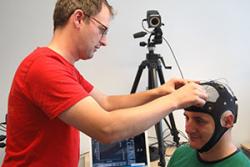Could elite athletes use brain ‘doping’ technology to enhance their performance?
 Dr Nick Davis (left) with Simon TomlinsonA neuroscientist at —«÷Þ…´∞… recently wrote an opinion piece published in the August edition of the journal ‚ÄúSports Medicine‚Äù on the possibilities of ‚Äòneurodoping‚Äô enhancing sporting performance. Society is all too familiar with the embarrassing expos√©s of sporting personalities taking performance enhancing drugs to exceed at their sport, but new research at —«÷Þ…´∞… suggests that a brain stimulation technique may also be able to provide similar results.
Dr Nick Davis (left) with Simon TomlinsonA neuroscientist at —«÷Þ…´∞… recently wrote an opinion piece published in the August edition of the journal ‚ÄúSports Medicine‚Äù on the possibilities of ‚Äòneurodoping‚Äô enhancing sporting performance. Society is all too familiar with the embarrassing expos√©s of sporting personalities taking performance enhancing drugs to exceed at their sport, but new research at —«÷Þ…´∞… suggests that a brain stimulation technique may also be able to provide similar results.
Dr Nick Davis from the has been exploring how the non-invasive transcranial direct current stimulation (tDCS) technique could be applied to aid elite sports men and women. tDCS is a form of brain stimulation which involves placing an electrodes patch above identified parts of the brain and then a current is sent through this circuit.
Dr Davis explains: “This technique is used extensively in science and medicine, such as in aiding those rehabilitating from a stroke, but it occurred to me that this very technique could also be used to improve sporting performance.
“For example, for a tennis player to have a strong serve they need to practise a great deal, if they practised their motor skills wearing electrodes, they might learn faster and better. On the other hand, improving visual perception may help to react and return a serve. So brain stimulation could improve different types of sporting skill.
“There are two ways that brain stimulation could possibly improve sporting performance. One is during training, when it could help you focus and help you learn motor actions, the other aspect is in performance, so potentially you could focus better and have quicker reactions.
“This research is in its early stages, and could be potentially dangerous, especially as we don’t know of any long-term effects yet.”
Measures are in place in many sports to detect performance enhancing drugs but it is not currently possible to determine whether any brain stimulation techniques have been used. Dr Davis’ paper also suggests that neurodoping may have different uses in different sports and that each sport must determine whether neurodoping should be considered cheating or as a legitimate aid to training and development.
Publication date: 2 August 2013
